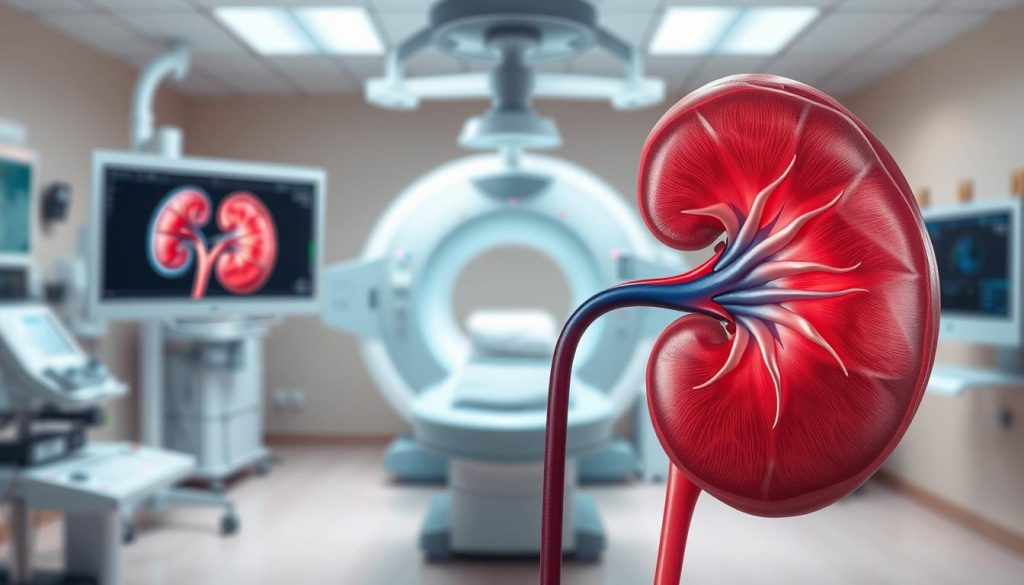Kidney cancer, also known as renal cell carcinoma, is a serious disease. It affects thousands of Americans every year. This guide will help you understand this disease better.
We’ll cover everything from early signs to new treatments. Our aim is to give you the knowledge you need. This will help you make smart choices about your health or support loved ones.
We’ll explain tough medical terms and talk about the latest treatments. We’ll also share inspiring stories from people who’ve battled kidney cancer. Whether you’re just learning about it, going through treatment, or want to know more, this guide is here to help.
What is Kidney Cancer: Basic Understanding
Kidney cancer is a serious disease that affects thousands of Americans each year. It happens when cells in the kidneys grow too much and form a tumor or mass. Knowing how kidneys work and the types of kidney cancer is key to understanding this disease.
Structure and Function of Healthy Kidneys
Our kidneys are shaped like beans and filter our blood. They remove waste and help control fluid balance. Inside each kidney, there are millions of tiny units called nephrons. These units work hard to keep our bodies balanced.
Types of Kidney Cancer
The most common kidney cancer is renal cell carcinoma. It starts in the kidney’s small tubes. Other types, like transitional cell carcinoma and Wilms tumor, are less common. Wilms tumor mainly affects children.
Risk Factors and Causes
While we don’t always know why kidney cancer happens, some things can increase your risk:
- Smoking
- Obesity
- High blood pressure
- Family history of kidney cancer
- Long-term dialysis treatment
Knowing these risk factors can help find kidney tumors early. If you’re worried about a tumor, talk to a doctor. They can help with evaluation and advice.
Early Warning Signs of Kidney Cancer
Spotting kidney cancer symptoms early is tough. Many signs are small and can be mistaken for other issues. Knowing these warning signs is key for early detection and treatment.
Blood in urine is a common sign. It might look pink, red, or like cola. Even if you can’t see it, a urine test can find tiny blood spots. Also, pain in the side or lower back that doesn’t go away is a red flag.
Other signs include unexplained weight loss, feeling very tired, and not wanting to eat. You might also feel a lump in your side or belly. Fever that keeps coming back without a clear reason is another warning sign.
- Blood in urine
- Persistent side or back pain
- Unexplained weight loss
- Fatigue and loss of appetite
- Abdominal mass
- Recurring fever
Remember, these symptoms don’t always mean you have kidney cancer. Many other conditions can cause similar signs. Regular health check-ups are important, more so if you’re at risk due to smoking, being overweight, or family history. If you keep feeling these symptoms, see your doctor right away for a check-up.
Common Symptoms and When to Seek Medical Help
Spotting kidney cancer symptoms early is key to better treatment. Some signs are subtle, while others need quick medical help. Let’s look at the symptoms of kidney cancer, including signs of metastatic kidney cancer.
Physical Symptoms
Kidney cancer often shows up with physical signs. These can include:
- Blood in urine (hematuria)
- Lower back pain on one side
- A lump or mass in the side or lower back
- Swelling in the ankles or legs
Systemic Symptoms
As kidney cancer gets worse, it can spread to the whole body. Look out for:
- Unexplained weight loss
- Fatigue or weakness
- Persistent fever not caused by infection
- Loss of appetite
These signs might mean the cancer is getting worse, possibly spreading.
Emergency Warning Signs
Some symptoms need immediate medical help:
- Sudden, severe abdominal pain
- Heavy, uncontrolled bleeding in urine
- High fever with shaking chills
- Sudden shortness of breath
These could mean serious complications or cancer spread. If you have these symptoms, go to the emergency room right away.
Stages of Kidney Cancer Development
Knowing the stages of kidney cancer is key for both patients and doctors. Staging shows how far the disease has spread and helps decide treatment. For renal cell carcinoma, the most common kidney cancer, doctors use a system from stage I to IV.
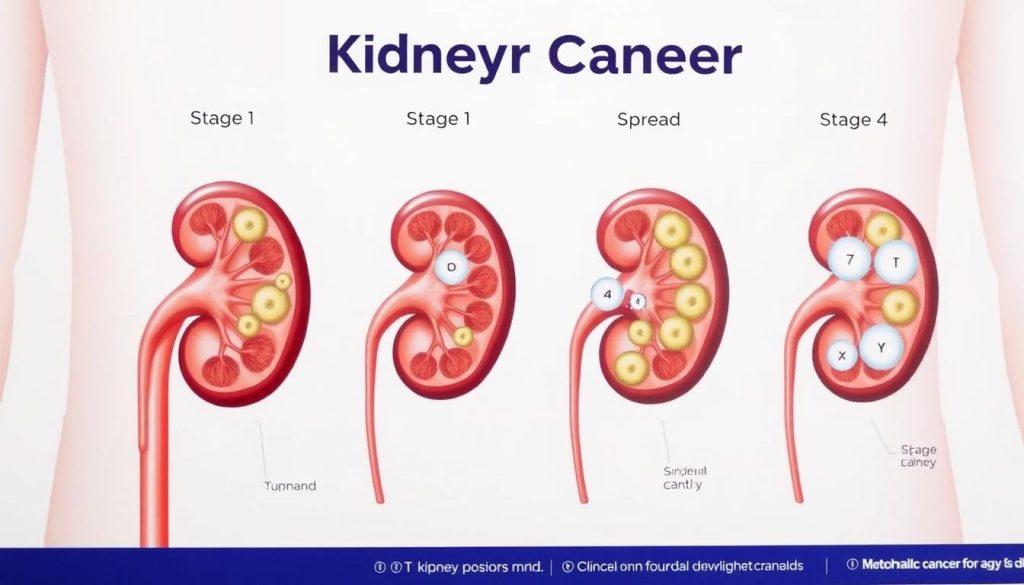
Stage I kidney cancer is small, up to 7 cm, and stays in the kidney. As it grows, it might get bigger or spread. Stage II tumors are larger but also stay in the kidney. Stage III means the cancer has reached nearby lymph nodes or major veins.
Stage IV is the most serious, with cancer in distant places like the lungs, bones, or brain. Doctors use tests like imaging and biopsies to find out the stage.
For those with renal cell carcinoma, knowing the stage is important. Early-stage cancers often have better treatment options. Advanced stages might need more treatments, like targeted therapies or immunotherapy.
| Stage | Description | Common Treatment Approaches |
|---|---|---|
| I | Tumor ≤ 7 cm, confined to kidney | Surgery (partial or total nephrectomy) |
| II | Tumor > 7 cm, confined to kidney | Surgery (usually total nephrectomy) |
| III | Spread to nearby lymph nodes or major veins | Surgery plus targeted therapy or immunotherapy |
| IV | Spread to distant organs | Systemic therapy, sometimes with surgery |
Regular check-ups and scans are important to watch for changes in the cancer’s stage. This helps doctors adjust treatment plans for the best care for each patient with renal cell carcinoma.
Diagnostic Procedures and Tests
Doctors use different tests to find kidney tumors or renal masses. These tests help figure out if cancer is there and how big it is. They also help make a treatment plan that fits each patient.
Imaging Studies
Imaging tests are key in finding kidney tumors. CT scans give detailed pictures of the kidneys. They help doctors spot even small tumors. MRI scans give more info about soft tissues and blood vessels. Ultrasounds are often the first test because they’re safe and easy to do.
Laboratory Tests
Blood and urine tests give clues about kidney function and health. They check for anemia, liver function, and substances that might show a tumor. Urinalysis can find blood in the urine, a sign of tumors.
Biopsy Procedures
Sometimes, a biopsy is needed to confirm cancer. A small tissue sample is taken from the area in question. It’s then checked under a microscope for cancer cells. Biopsies can be done with a needle guided by imaging or during surgery.
These tests work together to give a full picture of a patient’s condition. They help guide treatment for kidney tumors and masses. Early and accurate diagnosis is vital for good treatment results.
Understanding Renal Cell Carcinoma
Renal cell carcinoma is the most common kidney cancer. It begins in the lining of tiny tubes in the kidney called nephrons. These cells filter blood and make urine. When they grow uncontrollably, they form a tumor.
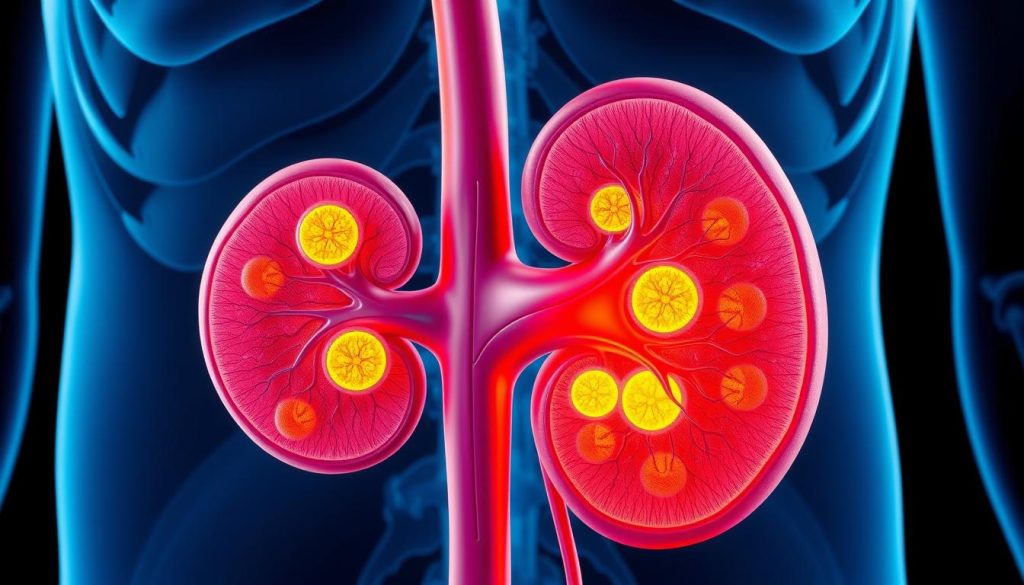
There are different subtypes of renal cell carcinoma. Each subtype has unique features that affect treatment and outlook. The main types are:
- Clear cell (75% of cases)
- Papillary (15% of cases)
- Chromophobe (5% of cases)
- Other rare types (5% of cases)
Doctors use special tests to determine which subtype a patient has. This helps guide treatment choices. Some subtypes grow faster or spread more easily. Early detection of renal cell carcinoma is key for better outcomes.
| Subtype | Frequency | Growth Rate | Spread Risk |
|---|---|---|---|
| Clear cell | 75% | Moderate | High |
| Papillary | 15% | Slow | Moderate |
| Chromophobe | 5% | Slow | Low |
| Other rare types | 5% | Varies | Varies |
Treatment for renal cell carcinoma may include surgery, targeted therapy, or immunotherapy. The choice depends on the cancer stage, subtype, and overall health of the patient. Advances in treatment have improved survival rates for many people with this disease.
Treatment Options for Localized Kidney Cancer
When you’re diagnosed with localized kidney cancer, you have several treatment options. The main goal is to remove the tumor and keep your kidney working well. Let’s look at the surgical methods and what to expect during recovery.
Surgical Approaches
Nephrectomy is a common treatment for kidney cancer. It means removing part or all of the kidney. For smaller tumors, doctors might suggest nephron-sparing surgery. This method aims to remove just the cancerous tissue, keeping the healthy parts of the kidney.
Minimally Invasive Techniques
New medical technologies have brought less invasive surgeries. Laparoscopic and robotic-assisted surgeries use smaller cuts, cause less pain, and help you recover faster. These methods work for both nephrectomy and nephron-sparing surgeries.
Recovery Expectations
Recovery times after kidney cancer surgery vary. Most patients spend a few days in the hospital. It can take 4-6 weeks to fully recover. During this time, you’ll slowly get back to your normal activities. Aftercare includes regular check-ups to watch your kidney’s health and make sure the cancer doesn’t come back.
| Procedure | Hospital Stay | Full Recovery |
|---|---|---|
| Open Nephrectomy | 3-5 days | 6 weeks |
| Laparoscopic Nephrectomy | 2-3 days | 4 weeks |
| Nephron-Sparing Surgery | 2-4 days | 4-6 weeks |
Your doctor will pick the best treatment for you based on your situation. Remember, catching kidney cancer early and treating it quickly can greatly improve your chances of recovery.
Advanced Treatment for Metastatic Disease
Metastatic kidney cancer is tough for patients and doctors. When cancer spreads, treatment aims to ease symptoms and slow it down. A team of experts creates a care plan that fits each patient’s needs.
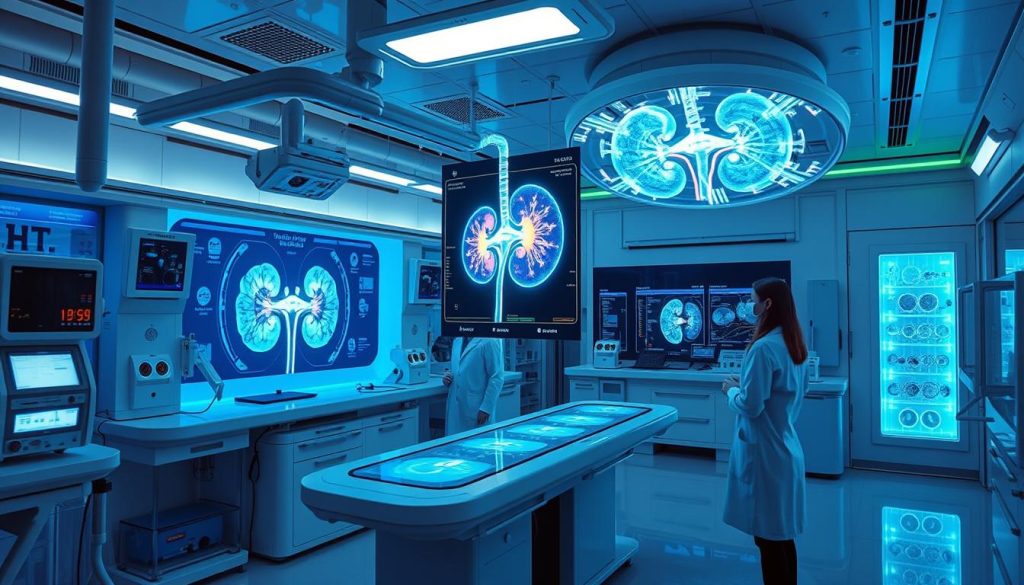
Systemic therapies are key in treating metastatic kidney cancer. These treatments aim at cancer cells all over the body, not just in the kidneys. Options include:
- Targeted therapy drugs
- Immunotherapy medications
- Combination approaches
Palliative care is vital for managing metastatic kidney cancer. It focuses on improving life quality by tackling pain, fatigue, and other symptoms. Palliative treatments may include:
- Radiation therapy to shrink tumors
- Pain management techniques
- Emotional and psychological support
Clinical trials offer hope for patients with metastatic kidney cancer. These studies test new treatments and combinations. Patients should talk to their healthcare team about joining a trial.
Though metastatic kidney cancer is hard to treat, research keeps improving. By using advanced therapies and supportive care, patients can live better and possibly longer.
Targeted Therapy and Immunotherapy Advances
Kidney cancer treatment has made big strides with targeted therapy and immunotherapy. These new methods bring hope to patients, even those with advanced disease.
Types of Targeted Drugs
Targeted therapy blocks certain molecules that help cancer grow. For kidney cancer, drugs target blood vessel formation or growth signals. Some common ones are:
- Tyrosine kinase inhibitors (TKIs)
- mTOR inhibitors
- VEGF inhibitors
These drugs can slow down tumor growth and spread. This improves survival chances for many patients.
Immunotherapy Options
Immunotherapy boosts the body’s natural defenses against cancer. It has shown great promise in treating kidney cancer. Key drugs include:
- PD-1 inhibitors
- PD-L1 inhibitors
- CTLA-4 inhibitors
These medications help the immune system better recognize and attack cancer cells.
Combination Treatments
Combining targeted therapy with immunotherapy has shown exciting results. This mix can make treatments more effective and fight drug resistance. Doctors choose different combinations based on the cancer’s stage and the patient’s health.
While these treatments offer new options, they can have side effects. Patients should talk to their healthcare team about risks and benefits. This helps find the best treatment plan.
Clinical Trials and Emerging Treatments
Kidney cancer research is moving fast, with clinical trials leading the way. These studies look into new drugs, treatment mixes, and advanced therapies. They could change how we treat kidney cancer in the future.
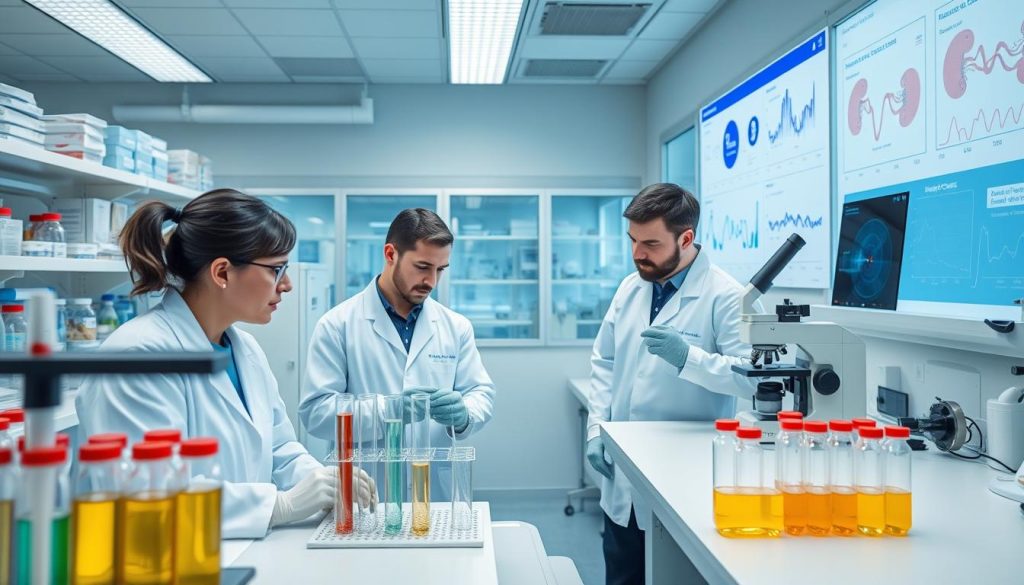
Patients can try these new treatments by joining clinical trials. Many studies are on targeted and immunotherapies. They aim to boost survival chances and life quality for kidney cancer patients.
Some exciting research areas include:
- Personalized medicine approaches
- Novel immunotherapy combinations
- Targeted drugs that stop cancer cell growth
- Minimally invasive surgical techniques
To find clinical trials, talk to your oncologist or look online. Joining a trial means getting new treatments and helping science advance.
Though trials have risks, they’re safe thanks to strict rules. Patients get careful watching and might get treatments not available yet. Always talk about the good and bad with your doctor before joining a trial.
As research goes on, new treatments from trials might become common. This could bring better results for kidney cancer treatment.
Side Effects Management and Support
Dealing with kidney cancer treatment can be tough. Knowing about common side effects and coping strategies helps patients feel better during their journey.
Common Treatment Side Effects
Kidney cancer treatments may lead to fatigue, nausea, and changes in appetite. Some people get skin rashes, diarrhea, or high blood pressure. It’s important to tell your healthcare team about these side effects so they can help manage them.
Coping Strategies
Here are some ways to handle side effects:
- Maintain a balanced diet
- Stay hydrated
- Get regular, gentle exercise
- Practice relaxation techniques
- Keep a side effect journal
Support Resources
There are many resources for kidney cancer patients and their families:
- Support groups: Connect with others facing similar challenges
- Counseling services: Professional help for emotional well-being
- Patient advocacy organizations: Offer education and support
- Online forums: Share experiences and advice with fellow patients
Remember, you’re not alone in your kidney cancer journey. Reach out to your healthcare team and support network for guidance and help in managing side effects and finding valuable resources.
Lifestyle Changes During Treatment
Living with kidney cancer is more than just treatments. Making positive lifestyle changes can greatly improve your health and support your body during this tough time.

Eating right is key when you have kidney cancer. A diet full of fruits, veggies, and lean proteins keeps you strong and full of energy. But, it’s important to drink the right amount of water too. Talk to your doctor about how much to drink, as it can vary based on your health.
Exercise is also important, if your doctor says it’s okay. Start with easy things like short walks or light stretching. As you get stronger, you can do more.
Managing stress is critical for kidney cancer patients. Try deep breathing, meditation, or yoga to help. These can lower your stress and make life better during treatment.
Getting enough sleep is also vital for healing and keeping your immune system strong. Try to sleep 7-9 hours each night. If sleep is hard, talk to your doctor about what you can do.
Quitting smoking and drinking less alcohol can also help. Your healthcare team can offer help to make these changes.
Every person’s fight with kidney cancer is different. Work with your medical team to create a lifestyle plan that fits you. This plan should support your treatment and improve your health.
Follow-up Care and Monitoring
After you’ve had kidney cancer treatment, it’s important to keep up with follow-up care. This helps find any cancer that comes back early. It also helps manage any long-term health issues. Your healthcare team will make a plan just for you.
Surveillance Schedule
Follow-up care includes physical exams, blood tests, and imaging studies. How often you need to go depends on your cancer’s stage and treatment. Here’s a basic schedule:
| Time After Treatment | Appointment Frequency | Common Tests |
|---|---|---|
| First 1-2 years | Every 3-6 months | Physical exam, blood tests, CT scan |
| Years 3-5 | Every 6-12 months | Physical exam, blood tests, CT or MRI scan |
| After 5 years | Annually | Physical exam, blood tests, imaging as needed |
Long-term Health Management
Living with kidney cancer means taking care of your health every day. Here are some important tips:
- Eat a diet full of fruits and veggies
- Stay active to keep your immune system strong
- Stop smoking to lower your cancer risk
- Keep an eye on your blood pressure and kidney health
- Talk about any emotional or mental health issues
Your healthcare team is always there to help you. If you have any worries or notice any health changes, talk about them during your follow-up visits.
Prevention Strategies and Risk Reduction
Reducing the risk of kidney cancer is vital for our health. While some risks are out of our hands, many lifestyle choices can help. These choices can greatly lower our chances of getting this disease.
Keeping a healthy weight is important. This can be done through regular exercise and eating a diet full of fruits and vegetables. Drinking less alcohol and quitting smoking are also key steps. Drinking plenty of water helps remove toxins from the kidneys.
If you have a family history of kidney cancer, getting regular check-ups is a must. Working in jobs where you’re exposed to harmful chemicals can also raise your risk. So, it’s important to follow safety rules at work.
| Prevention Strategy | Impact on Kidney Cancer Risk |
|---|---|
| Maintain healthy weight | Reduces risk by up to 30% |
| Quit smoking | Lowers risk by 50% after 10 years |
| Regular exercise | Decreases risk by 22% |
| Limit alcohol intake | Reduces risk by 28% for moderate drinkers |
By making these lifestyle changes and getting regular health screenings, we can lower our risk of kidney cancer. Early detection and prevention are essential in fighting this disease.
Living with Kidney Cancer: Patient Stories
Every kidney cancer diagnosis has a unique story of hope and resilience. These personal accounts show the challenges patients face and their victories. One inspiring story is Sue, a 70-year-old woman who fought metastatic kidney cancer with courage.
Sue’s story shows how far kidney cancer treatment has come. Despite her complex case, she had surgeries and new therapies at Johns Hopkins Hospital. Her treatment included spinal surgery, kidney removal, and a mix of targeted radiation, immunotherapy, and drugs. Amazingly, her chest and heart metastases disappeared, surprising even her doctors.
Stories like Sue’s show the value of personalized care in treating kidney cancer. Every patient’s journey is different, and modern treatments consider their unique needs. These stories highlight the role of expert teams, new treatments, and the courage of those with kidney cancer.
Living with kidney cancer is tough, but these stories offer hope. They show the progress in treating kidney cancer and the chance for positive results. For those fighting this disease, these stories remind them to stay strong, stay hopeful, and make the most of every day.
FAQ
Q: What are the early warning signs of kidney cancer?
A: Kidney cancer’s early signs are often missed. Look out for blood in your urine, pain in your lower back, unexplained weight loss, and feeling very tired. But, many people with kidney cancer don’t show symptoms early on. That’s why regular health check-ups are key, even more so for those at higher risk.
Q: How is kidney cancer diagnosed?
A: Doctors use several ways to find kidney cancer. They might do CT scans, MRIs, ultrasounds, blood tests, and urine tests. Your doctor will pick the best tests based on your symptoms and risk factors.
Q: What are the treatment options for localized kidney cancer?
A: For kidney cancer that’s only in one kidney, surgery is usually the first choice. You might have your whole kidney removed or just the tumor. The decision depends on the tumor’s size, where it is, and how well your kidney works. Sometimes, doctors use laparoscopic or robotic surgery for less invasive options.
Q: How is metastatic kidney cancer treated?
A: For kidney cancer that has spread, treatments like targeted therapy and immunotherapy are used. Sometimes, new treatments from clinical trials are available. Palliative care is also important to help manage symptoms and improve life quality. The treatment plan is made just for you, based on your cancer and health.
Q: What are the side effects of kidney cancer treatments?
A: Side effects vary by treatment. Surgery can cause pain, infection risk, and temporary kidney function changes. Targeted therapies might lead to fatigue, high blood pressure, and skin issues. Immunotherapy can cause flu-like symptoms or autoimmune reactions. Talk to your doctor about these side effects, as they can often be managed.
Q: Are there any lifestyle changes that can help during kidney cancer treatment?
A: Yes, making healthy lifestyle choices can help. Eat a balanced diet, stay active, manage stress, and avoid tobacco and too much alcohol. Always check with your doctor before making big changes during treatment.
Q: What kind of follow-up care is needed after kidney cancer treatment?
A: After treatment, you’ll need regular check-ups to watch for cancer coming back. This might include imaging tests, blood tests, and physical exams. These visits will get less frequent if there’s no sign of cancer. Long-term care also focuses on managing any lasting effects and keeping your kidneys healthy.
Q: Can kidney cancer be prevented?
A: While not all kidney cancers can be prevented, some steps can lower your risk. Stay at a healthy weight, don’t smoke, control your blood pressure, and avoid harmful toxins at work. If you have a family history or certain genetic conditions, talk to your doctor about screening. It’s vital to discuss your risk factors with a healthcare professional.












